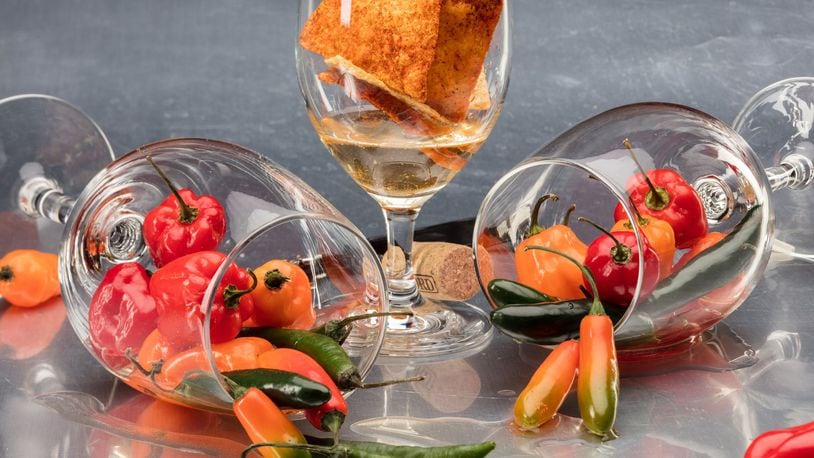What can I say — some of us are just traditional. For example, as far as water goes, I still prefer the original flavor. Just straight up, in a glass. Some H, a little O, and that’s it. Does that make me stuck in the past? I don’t know, maybe. But I like what I like, and I’m not going to apologize for it. Speaking of O, there’s another thing. I’m fine breathing the old-school oxygen. I don’t even care if it’s odorless. Would it be nice if it were pork chop-scented? Sure. Of course it would. But I can survive without that. Sometimes I even think oxygen is perfect just the way it is.
I’m of the mind that just because something is possible doesn’t make it better. Is being connected to everything all at once on a device that you keep in your pocket or constantly hold in your hand a good thing? Is relying on that device for some of your thinking, most of your socializing and all of your shopping a good thing? If everyone wore headphones all the time, would that be good? What about virtual reality goggles? What if we consumed all of our meals in pill form? Would that be a good thing? Where do we draw the line between purity and detrimental advancement?
I got to thinking about all of this when a box of flavored wine showed up at my place. My argument is a little bit apples to taffy apples, because technological advancement has improved wine substantially around the world, and I’ve already mentioned that “flavored” wine goes back eons. (Retsina, an ancient wine style, is still made in Greece with the addition of pine resin.) Plus, lots of commercial wines have additives in them today — even aroma- and flavor-enhancers. But their purpose is to make the wine smell and taste like better wine, not to turn it into a hybrid wine beverage. It’s a fine line, I know, but the larger and more apples-to-regular apples question is: Why isn’t wine that’s just wine good enough for us? The answer, of course, is: It is good enough.
Out of curiosity, and with a completely open mind, I tried the flavored wines. One was a white, flavored with peaches and ginger root. It was fine, but if I hadn’t known it was flavored with actual peaches, I would have just assumed that it had notes of peach in it, as some white wines do. I didn’t really get much ginger out of it, but maybe that is a credit to the winemaker for not overdoing it. The bottom line is, it was a decent wine.
Two other wines from the same winery, a white flavored with habanero and jalapeno peppers, and a red flavored with coffee and jalapeno peppers, were — how do you say — not as successful. I did a little search to see if there were more flavored wines out there, and it turns out there are (or at least there are websites claiming there are), including some with ice cream and cake flavors added.
Everybody, come on. There is no reason for any of this. Why can’t we be content with cake-flavored cake? Yes, wine smells and tastes like a lot of different things: nuts, berries, leather, flowers, tropical fruits, old barns full of animals, mint, citrus, cedar, black licorice, raspberry jam, petroleum, gravel, fresh-cut grass, bubble gum, smoke, vanilla, mushrooms, toast, bacon, nutmeg, eucalyptus, wet dirt, black pepper, grapefruit and dozens of others. But that is part of the magic and beauty of wine — that those aromas and flavors show up in the first place, that they occur at all. They allow us to experience, in some way, the place where the wine is from. Where it was grown and made.
Kiwi strawberry-flavored water, Kosher dill-flavored potato chips and pumpkin-flavored mayonnaise? Indoor snow-skiing in Dubai? Come on, now. Let’s all join hands and stop doing things just because we can do them. I completely made up the part about the mayonnaise (because I can), but I won’t be surprised if I see it come October. I’m pretty confident that flavored wine hybrids will not catch on (and yes, I’ve made bolder predictions).
Despite at least one winery’s suggestion that flavored wine could become a trend and then be widely accepted, as other flavored beverages have, I think flavored wine will always be an aberration, and the companies that manufacture it will always be outsiders — like artificial intelligence robots are now. We can do it — we can make machines that think like us, look like us and move like us. But why is that better than us being us? Will it be a good thing if there is one of them for every one of us? We can custom-flavor all of our wine too. We can make it nacho-flavored if we want. But why would we? Why should we?
We love wine because it represents some degree of miracle every time it comes into being. With its wide range of flaws, shortcomings and transcendence, it is, in its essence, perfect just the way it is. And the robots can’t have any. It’s ours, and we’re not sharing it — not with robots, or even with fruits other than grapes, or hot peppers, or cake and ice cream. At least I’m not.
About the Author
